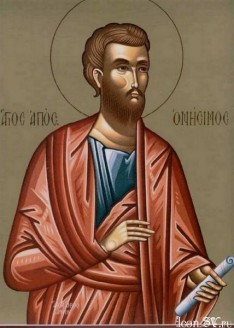 One of the shortest books in the New Testament is the Apostle Paul’s letter to Philemon, a Christian who lived in Colosse. Philemon owned a slave named Onesimus who ran away. In the course of time, Onesimus met the Apostle Paul and committed his life to Christ. In the social world that Paul lived in, slaves were considered the property of the owner. So, as much as Paul wanted Onesimus by his side (see verse 13), he was obligated by Roman law to return the runaway slave to his owner. Paul sent the runaway slave—who was probably dreading his master’s wrath—with a letter that would become part of the Bible.
One of the shortest books in the New Testament is the Apostle Paul’s letter to Philemon, a Christian who lived in Colosse. Philemon owned a slave named Onesimus who ran away. In the course of time, Onesimus met the Apostle Paul and committed his life to Christ. In the social world that Paul lived in, slaves were considered the property of the owner. So, as much as Paul wanted Onesimus by his side (see verse 13), he was obligated by Roman law to return the runaway slave to his owner. Paul sent the runaway slave—who was probably dreading his master’s wrath—with a letter that would become part of the Bible.
In the letter Paul explained that Onesimus had embraced the Christian Faith just as his master did. This meant that the runaway slave was no longer just property but a fellow brother in Christ. Paul wrote to Philemon:
For perhaps he departed for a while for this purpose, that you might receive him forever, no longer as a slave but more than a slave—a beloved brother, especially to me but now much more to you, both in the flesh and in the Lord. (Verses 15-16; NKJV)
Christ’s lordship had revolutionary implications for social relations in the first century Roman Empire and for many other societies as well. A dynamic of equality was introduced based on Christ’s lordship and Christian charity. This is different from secular equality promoted by modern society today, which is based on the notion of human rights. It also differed from that of the ancient Greeks. The ancient Greeks who were citizens (members of the polis) prided themselves on their freedom, that is, their ability to engage in rational discourse with fellow citizens and share in the duties of the city. The ancient Greeks looked down on the slaves who had no freedom but lived under compulsion. Paul did not throw his weight around as an Apostle but rather sought to gain Philemon’s voluntary consent. He writes in verse 14:
But without your consent I wanted to do nothing, that your good deed might not be by compulsion, as it were, but voluntary.
The attitude we find here contrasts sharply with the hierarchical society of ancient Greco-Roman society. The Christian Gospel (Good News) proclaimed the kingdom of God in which all Christians were slaves of Jesus Christ and were obligated to follow Christ’s new commandment, that is, to love each other as he loved them (John 15:9-12). The social impact of the Gospel can be seen in early church history. The Orthodox Study Bible notes that according to ancient tradition Philemon was consecrated bishop of Colosse. It also notes that the Onesimus in Paul’s letter may be the same Onesimus mentioned by Ignatius of Antioch in his Letter to the Ephesians (chapters 1, 2, and 6) who was bishop of Ephesus. See Ignatius of Antioch’s Letter to the Ephesians.

Icon of Apostle Onesimus – source
It was from this radically new perspective on human relations that Paul wrote one of the shortest books in the Bible that contains many important lessons for Christians today. Paul’s emphasis on voluntary consent reveals something of God’s character. It cautions us against seeing God working by compulsion. The Reformed doctrine of irresistible grace seems to imply an element of compulsion. A similar outlook can be seen in the Reformed doctrine of the perseverance of the saints or effectual calling, which teaches that God makes the elect willing to be saved. The Synod of Dort’s rejection of the idea that divine election could be resisted implies divine compulsion. See “Plucking the TULIP.”
Philemon verse 15 bears a strong resemblance to a passage in the Book (Wisdom) of Sirach (33:32), part of what Protestants consider the Apocrypha. It is quite possible that Paul, a Greek-speaking Jew, was familiar this verse and had this verse in mind when he wrote out verse 15.
If you own a servant, treat him as a brother.
For you will need him as your own soul.
If you treat him badly and he runs away,
Which way will you look for him?
(Wisdom of Sirach 33:32-33; Orthodox Study Bible)
Protestants might prefer the 1611 King James Version:
30 If thou haue a seruant, let him bee vnto thee as thy selfe, because thou hast bought him with a price.
31 If thou haue a seruant, intreate him as a brother: for thou hast neede of him, as of thine owne soule: if thou intreate him euill, and he runne from thee, which way wilt thou goe to seeke him?
Reading Philemon against Book of Sirach helped me to see how the Apocrypha prepared the way for the moral teachings of the New Testament and informed the writings of the Apostles. When I was studying the Old Testament at Gordon-Conwell Theological Seminary, I heard very little if anything about the Apocrypha. This is understandable because Gordon-Conwell being a Reformed seminary followed the Hebrew canon of the Old Testament and gave little attention to the Apocrypha.
The Wisdom of Sirach was part of the Apocrypha or what the Orthodox Church calls the Deuterocanon, meaning “second canon.” The Old Testament quotations in the Greek New Testament point towards the Apostles relying on the Greek Septuagint, not the Hebrew Old Testament. This leads to one major difference between Orthodoxy and Protestantism today. Where the Orthodox Church regards the Apocrypha as Scripture, the majority of Protestants do not.
It is important to keep in mind that early Protestant bibles did in fact have the Apocrypha. See for example the 1611 version of the King James Version, the pre-1599 versions of the Geneva Bible favored by the English Puritans, and Luther’s German Bible. In other words, historically all three major Christian traditions—Orthodox, Roman Catholic, and Protestant—recognized the Apocrypha as part of the Bible. It was not until the seventeenth and eighteenth centuries that zealous Protestants who wanted to purify the Bible excluded the Apocrypha. Many Protestants and Evangelicals today are unaware that the Bible they hold in their hands is a mutilated text. See “Geneva Bible and Sola Scriptura.”
I wish I knew about the Apocrypha when I was a Protestant. If I had known about the Apocrypha, I would have had a bigger Old Testament to read from. I would have viewed the Old Testament and the New Testament as two closely related halves with Christ as the Center. The Protestant Bible with its four hundred year gap between the book of Malachi and Matthew’s Gospel gives one the impression that the Old and New Testaments comprised two separate dispensations marked by discontinuity. With the Orthodox Bible one gets a stronger sense of continuity between the Old and New Testaments. In the case of Paul’s letter to Philemon, I realized that what Paul wrote to Philemon was not some radically new teaching but rather a fulfillment of the moral teachings of the Old Testament in Christ. Paul did not apply the biblical teaching like a Jewish rabbi, but as an Apostle of Christ who was keenly aware of how Jesus Christ fulfills the Old Testament and transforms human relations.
Robert Arakaki


Have any thoughts about Book of Enoch 1 or Tablet of Gabriel?
Josh,
These books are not part of the biblical canon and seem to have no bearing on Paul’s letter to Philemon. Therefore, I have no thoughts on them.
Robert